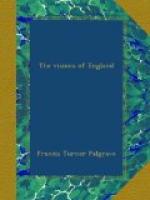He hove his huge two-handed blade,
He cried ‘’Tis time to die!’
And smote around him like a flail,
And clear’d a space to lie:—
’Thank God!’—no more;—nor
now could life
From loved and lost divide him:—
And night fell o’er De Montfort dead,
And England wept beside him.
In the words given here to Simon (and, indeed, in the bulk of my narrative) I have almost literally followed Prothero’s Life. The struggle, like other critical conflicts in the days of unprofessional war, was very brief.
THE DIRGE OF LLYWELYN
December 10: 1282
Llanyis on Irfon, thine oaks in the drear
Red eve of December are wind-swept and sere,
Where a king by the stream in his agony lies,
And the life of a land ebbs away as he dies.
Caradoc, thy sceptre for centuries kept,
Shall it pass like the ripple, unhonour’d, unwept:
Unknowing the lance, and the victim unknown,
Far from Aberffraw’s halls and Eryri the lone!
O dark day of winter and Cambria’s shame,
To the treason of Builth when from Gwynedd he came,
And Walwyn and Frankton and Mortimer fell
Closed round unawares by the fold in the dell!
—As who, where the shadow beneath him is
thrown,
By some well in Saharan high noontide alone
Sits under the palm-tree, nor hears the low breath
Of the russet-maned foe panting hot for his death;
So Llywelyn,—unarm’d, unaware:—Is
it she,
Bright star of his morning, when Gwynedd was free,
Fair bride, the long sought, taken early, goes by?
In the heart of the breeze the lost Eleanor’s
sigh?
Or the one little daughter’s sweet face with
a gleam
Of glamour looks out, as the dream in a dream?
Or for childhood’s first sunshine and calm does
he yearn,
As the days of Maesmynan in memory return?
Or,—dear to the heart’s-blood as
first-love or wife,—
The mountains whose freedom was one with his life,
Gray farms and green vales of that ancient domain,
The thousand-years’ kingdom, he dreams of again?
Or is it the rage of stark Edward; the base
Unkingly revenge on a kinglier race;
The wrong idly wrought on the patriot dead;
The dark castle of doom; the scorn-diadem’d
head?
—Lo, where Rhodri and Owain await thee!—The
foe
Slips nearing in silence: one flash—and
one blow!
And the ripple that passes wafts down to the Wye
The last prayer of Llywelyn, the nation’s last
sigh.
But Llanynis yet sees the white rivulet gleam,
And the leaf of December fall sere on the stream;
While Irfon his dirge whispers on through the combe,
And the purple-topt hills gather round in their gloom.
Where a king; The war in which Llywelyn fell was the inevitable result of the growing power of England under Edward I; and, considering the vast preponderance of weight against the Welsh Prince it could not have ended but in the conquest of Wales. Yet its issue, as told here, was determined as if by chance.




